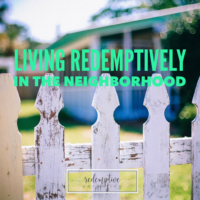
I have a love/hate relationship with the Nextdoor app. If you’re on it, I bet you do too. On one hand, it is a great resource. Just today in fact, my windows were washed for the first time (professionally that is) since we moved into our house almost 11 years ago. They look so good I wish now we had been doing it all along. But until seeing a Nextdoor post about the wonderful, well-priced window washer we used, I assumed it would cost too much. In addition to recommendations I also appreciate that Nextdoor provides a place for neighbors to warn others about suspicious activity and inquire about neighborhood happenings.
But on the other hand, Nextdoor can quickly become a forum of judgment and hate. In the same way teens might bully others from behind their screens and adults fire off heated Facebook comments or emails, posts on Nextdoor are often not written in the way we would say it to a person’s face. Or, maybe they are. But I imagine the reason it’s taking place online is because we are too cowardly to deal with the conflict face to face.
I get it, conflict stinks! Not having to deal with it directly is appealing. But it’s not the way of loving your neighbor as your self. It’s not the way of seeking to understand. And it’s not the way of living redemptively in relationships.
What got me thinking about this actually has nothing to do with Nextdoor (so no one think I’m passively pointing my finger at you!!). It came from watching this week’s episode (Season 4, Episode 3) of This is Us.
Kate and Toby’s new neighbor, Gregory, was upset about Toby’s car blocking the sidewalk. Words were exchanged, but with all Kate had on her mind, Gregory’s demands seemed petty. But that changed after another encounter when Gregory revealed why Toby’s parked car was so problematic.
Now Kate had new eyes to see him with compassion. She could identify with him and enter in. And enter in she did. In the final scene (*this is your spoiler alert*) we see Kate, stroller and dog in hand, and Gregory with his cane walking slowly side by side down the sidewalk.
Because we are sinners living in a broken world there will always be conflict. But there is a way of dealing with it that actually builds bridges instead of fences. When we really love neighbors the way we want to be loved it calls us to empathy, grace and forgiveness. It calls us to seek to understand, to give and take. To die to self even.
How many relationships might be different if this were our stance?
The problem is we can’t love our neighbor as ourselves. We love ourselves too much. But for self-centered, self-seeking people, Jesus denied himself. He perfectly loved not only difficult people, but people who hated him. People who gossiped, slandered and mocked him. People who stabbed him in the back and wanted him killed. For those too he died.
But because he lived the perfect life and died sacrificially, we who are in Christ wear his robe of perfection. And get this– God even views us as the perfect neighbor despite our own track record!
I don’t know about you but when I “get” what I don’t deserve it makes me care a little less about overgrown grass and more about sowing love. May we be people who reflect to other the grace we’ve been given. Even in conflict, may we treat others with dignity and respect, quick to listen, slow to speak and hearts open to receive, not reject.

